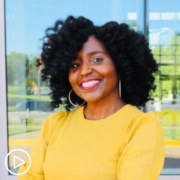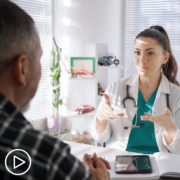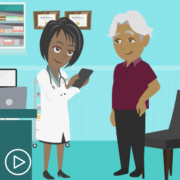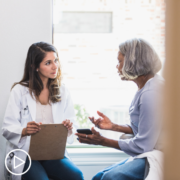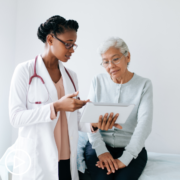HCP Roundtable: Breaking Through Myelofibrosis Practice Barriers from Patient Empowerment Network on Vimeo.
Explore the complex challenges and barriers in myelofibrosis care with Dr. Raajit K. Rampal from Memorial Sloan Kettering Cancer Center and Dr. Jeanne M. Palmer from the Mayo Clinic. Gain insights into therapeutic inertia, effective strategies for overcoming care barriers, and enhancing patient-centric care to improve myelofibrosis outcomes.
Related Resources:
Transcript:
Dr. Nicole Rochester:
Welcome to this Empowering Providers to Empower Patients EPEP program. I’m Dr. Nicole Rochester, founder and CEO of Your GPS Doc. EPEP is a Patient Empowerment Network program that serves as a secure space for healthcare providers to learn techniques for improving physician-patient communication and to overcome practice barriers. In this healthcare provider roundtable, we are discussing breaking through myelofibrosis practice barriers.
We’re going to talk about the nuanced challenges and practice barriers in myelofibrosis care. How do patient socioeconomic factors impact treatment access? We will look at gaps in the field and overcoming practice barriers such as lack of awareness, outdated practices, and therapeutic inertia, while also addressing solutions to enhance patient-centric care in myelofibrosis for improved patient outcomes.
It is my privilege to be joined by Dr. Raajit K. Rampal of Memorial Sloan Kettering Cancer Center. Dr. Rampal is a clinical translational investigator whose research focuses on the genetic events that contribute to the development and progression of leukemia and myeloproliferative neoplasms. Thank you so much for joining this EPEP program, Dr. Rampal.
Dr. Raajit K. Rampal:
Thanks so much for having me. It’s a pleasure to be here.
Dr. Nicole Rochester:
It’s also an honor to be joined by Dr. Jeanne Palmer, hematologist at Mayo Clinic. Dr. Palmer’s interest is in identifying novel targeted therapies for patients with myeloproliferative neoplasms. She strives to offer innovative therapies to patients in all stages of their disease through clinical trials. Thank you so much for joining us, Dr. Palmer.
Dr. Jeanne M. Palmer:
Thanks for having me.
Dr. Nicole Rochester:
So we’re going to start today’s discussion by diving into the nuanced challenges and practice barriers in myelofibrosis care. We know that some of those factors may be related to socioeconomic factors and health disparities. So, Dr. Rampal, I’m going to start with you. What are the primary barriers in myelofibrosis care, and how might these barriers impact accessing effective treatment for myelofibrosis?
Dr. Raajit K. Rampal:
Well, I think it’s broad in the sense that, if we think about access to care, I think that part of the problem lies in underdiagnosis, and that is really on the end of the spectrum of access to primary care I’d say, are people getting in and getting regular blood count checks, the things that are going to tip somebody off that, you know, if somebody has a hematologic issue or problem, I think that is a big part of the entire discussion and spectrum here.
And then the second thing is that this is a rare disease, and there are a handful of specialists throughout the world who deal with this. And so making sure that patients have access to expert care, which is not to undermine the quality care that’s provided in the community, but this is more a question about do patients have access to, you know, clinical trials or to the most updated knowledge, and that to me really revolves around people being able to have access to tertiary care referral center who has a myelofibrosis expert. So I think those are some of the barriers, at least in my mind.
Dr. Nicole Rochester:
Thank you so much. And, Dr. Palmer, I’d love to get your insight as well. From your perspective, what are the primary barriers to accessing effective treatment, and what strategies can be implemented to overcome these barriers?
Dr. Jeanne M. Palmer:
So I agree with everything that Dr. Rampal said, but I’d also want to add to it, like many people would have to travel a distance to see that specialist. And so one of the ways that I’ve been able to try to overcome that thus far is by telemedicine. So being able to have that ability to contact somebody over the Internet, I think, especially if they’re getting very good care locally, just being able to provide that sort of expert additional advice about how to manage their disease, what different options are available. Fortunately, this is a space where new drugs are coming pretty rapidly.
So I think that having the ability to be able to weed through all of these different drugs, understand the pros and cons of them, and advise patients is good. And if they can’t make it to see you, then they can’t get advice about the medications nor can the providers. Because recognizing this is such a rare disease, a community provider has a lot to keep track of. So trying to keep track of something that impacts so few patients is hard to do. I think the other big barrier is cost and support for getting these medications.
These medications are all, unfortunately, quite expensive, and new drugs that are coming down the horizon will probably be so as well. So being able to find the right support for them, even when insurance covers it, it’s sometimes with a very large copay. So trying to handle access to these drugs, not only in the knowledge of which drugs to give, but also the ability to be able to pay for them.
Dr. Nicole Rochester:
Wonderful. Thank you both for elucidating some of those barriers. And you both mentioned that this is a rare disease and, Dr. Rampal, you also talked about expert care. And so I’d love to know, and I’ll start with you, Dr. Rampal, how do referral patterns impact treatment access in myelofibrosis and particularly for underserved populations?
Dr. Raajit K. Rampal:
This is a really interesting question, because things are changing in the sense that, I think at least in the New York area, but probably true elsewhere, there’s increasing consolidation of healthcare as hospital systems buy up smaller practices. And that means that referral patterns are going to change and are changing. There’s more of an impetus for docs to refer patients within their own health network. And they may or may not have access to expert care within their network. I think that’s one thing to keep in mind.
And the second is that, the elephant in the room here is that you have to have insurance to get into these networks. You have to have the right insurance. And do all of these big academic tertiary centers accept every kind of insurance? The answer is no, they don’t. So right off the bat, you have a systemic barrier, but then with the changing referral patterns, and I think likely certain insurances being more likely to be accepted in certain networks, you’ve already kind of fragmented the entire system. So, is there a streamlined way for patients to get in? Right now, I think the answer is no, there are a lot of barriers.
Dr. Nicole Rochester:
Thank you, Dr. Rampal. Dr. Palmer, do you have anything to add? And also if you can touch on what healthcare providers should be aware of and what they can pay close attention to with regard to these barriers that you and Dr. Rampal have discussed?
Dr. Jeanne M. Palmer:
Right, so I completely agree with everything he said. I think it’s a real challenge, especially as you parse apart these different healthcare systems. I think one of the important things for patients to know and what providers can help with is providing sort of access to some of the patient advocacy sites. On these patient advocacy sites, they can find the name of different providers, and sometimes that helps them call in to get a referral.
Now, the insurance coverage is another challenge that’s a lot harder to manage. But I think one thing that patients can do is if within their own network, there isn’t an expert, at least being able to go to these patient advocacy sites, finding out who they should, who they can go see.
Dr. Nicole Rochester:
Wonderful, thank you. Well, we’ve been talking about how certain populations may experience more barriers. And certainly we know that’s at the root of health and healthcare disparities. So I want to move and start to talk a little bit about cultural competency. And I’ll go back to you, Dr. Rampal, what role do you believe cultural competency plays in addressing barriers in myelofibrosis care?
Dr. Raajit K. Rampal:
Yeah, I think one of the major tasks is to be aware that cultural competency is important. That to me is sort of the first step in everything. And in making this a little bit more granular. Not every patient approaches their disease or their diagnosis in the same way. And a lot of that is informed by their cultural beliefs, their community. And this is something, you know, living in a place like New York where we see people from all different cultures, this is a striking thing because there are people who, for example, you know, they come from, you know, strong religious faith backgrounds. Their approach to things is different.
In some respects, they approach the disease and the need for treatment in a very different way than people who come from other cultural communities or those who are, let’s say, even not coming from a religious setting. But if you’re not aware of those and you try to put the same sort of treatment paradigm on all patients, you’re going to run into conflicts at some point. So I think to me, the first step is to be aware that these things influence how people perceive their disease, how they perceive the treatments or their desire to even be treated. But if you’re not aware of those things at the outset, then you’re going to run into those issues, I think.
Dr. Nicole Rochester:
Thank you so much, Dr. Rampal. Well, we’ve been talking about the barriers that patients face. Dr. Palmer, can you speak to some of the obstacles or barriers faced by healthcare providers themselves when treating myelofibrosis patients?
Dr. Jeanne M. Palmer:
I think one of the challenging pieces, you know, I know in Arizona, we have a pretty big catchment area, because there’s not only the Phoenix metropolitan area, but there are a lot of smaller communities scattered throughout Arizona. And I think one of the issues that we have is, let’s say I want to start somebody on a new medication that potentially has a side effect of anemia or something.
Being able to manage them remotely is difficult, because a lot of times they may require a blood transfusion. Can they even get a blood transfusion where they’re at? Can they afford the 5-hour drive down to Phoenix to get that? So I think sometimes, even access to simple things, well, I guess it’s not that simple, but things like blood transfusions can be hard. Fortunately for labs, you’re often able to get them most places through various Labcorp, Quest, et cetera. But sometimes any type of infusional treatment can be really, really hard to get.
Dr. Nicole Rochester:
Thank you. Do you have anything to add, Dr. Rampal, with regard to barriers faced by providers?
Dr. Raajit K. Rampal:
No, I actually think that’s an important, that’s a really important thing. Because it depends on your area of the country and what access to resources patients have locally. If we’re thinking about this as sort of a hub and spoke model, that may be the outdated model. In other words, it’s not that people can afford to, you know, from a financial perspective or a time perspective, come into the major center and then go back. They need to get access to care locally, but you have to have the infrastructure, the healthcare infrastructure, if you will, to deliver that care. And that’s a difficult problem in many parts of the country.
Dr. Nicole Rochester:
Absolutely. Wonderful. Well, you talked about something maybe being outdated. That’s a perfect segue to our next conversation. And so I’ll start with you this time, Dr. Rampal. Can you speak to unforeseen or maybe outdated practice-related barriers that may hinder your work and that of your colleagues with regard to myelofibrosis treatment?
Dr. Raajit K. Rampal:
Yeah, I guess my broad answer to this is that things are changing rapidly and the pace of change is accelerated. In other words, when we think about myelofibrosis, the treatment paradigm probably, if you think about the last 15 years, in the early part of that, things were kind of relatively static and now they’re not as new knowledge emerges, as new treatments emerge. And the challenge here, again, speaking in general terms is, as Dr. Palmer pointed out, this is a rare disease. It’s not something that’s frequently seen by physicians in the community.
So how do you keep people up to date on something that is not the majority of what they do? It’s a very small percentage of what they see and do. And that’s an ongoing challenge. And I’m not sure there’s any perfect solution to that except for education. It’s just a question of how do you deliver that in a time-effective manner so that people can devote some time to getting up to date? But it is ultimately a good problem that things are changing rapidly.
Dr. Nicole Rochester:
Absolutely. And, Dr. Palmer, do you have any solutions or actions or things that healthcare providers can do as this treatment landscape rapidly evolves?
Dr. Jeanne M. Palmer:
I think it’s a real challenge because even when we look at sort of the dogma of like, well, what’s the response criteria? I mean, when you’re thinking of a lot of like solid tumors, you think, okay, did the tumor shrink a certain amount? Did the tumor go away? With myelofibrosis, when we think about even response criteria, it’s really challenging.
So I think I agree education is part of it, and it’s trying to figure out how to distill down the really important components of how do you manage these patients day-to-day? We can talk about the COMFORT study and the MOMENTUM study and everything else all we want to, that tested, were major studies that tested the drugs that we use, but then the nuances of how to manage them day-to-day is something that I think we could probably improve upon how we educate.
Dr. Nicole Rochester:
Thank you. So as we move on to our final topic, we’re going to start talking about collaborative care. You all have spoken about this being a rare disease, the need for expert care, the fact that not everyone has access to that expert care. And so the reality is that it’s going to take more than just experts like yourself in order to manage these patients. And so, Dr. Palmer, I’m going to start with you. What are the key components of an effective collaborative care ecosystem for myelofibrosis? And how can healthcare providers integrate these components to ensure comprehensive patient care?
Dr. Jeanne M. Palmer:
Well, I think one of the most important things is really making sure you’re having conversations with the patients, are able to sort of elucidate what’s really important to them and how they’re feeling. I think many patients actually are very aware of things that they want to or don’t want to do. And so, and then in a disease like this one, where there are lots of different options, there are also just nuances in the way you sort of treat things like, okay, do you want to take this side effect or that side effect? Or how do you want to approach this? Being able to have those conversations to really get their input on it is very important.
That’s one of the reasons I really enjoy treating this disease is because it’s not so regimented in how you do it. It becomes really a conversation, understanding how the patient’s feeling, understanding the side effects that they’re having, so you can better determine how you should continue with the therapy.
Dr. Nicole Rochester:
Wonderful. I appreciate that. And I appreciate that you brought in the patient perspective when we’re speaking about collaborative care, because, of course, they need to be involved in their part of their medical team. Dr. Rampal, what about the healthcare providers? How can you cultivate a collaborative ecosystem with other healthcare providers as you all provide care for myelofibrosis?
Dr. Raajit K. Rampal:
Part of my advice here is simple, which is to pick up the phone. And I’ll tell you why I put it that way. I think that what happens…and this is something I always emphasize to our trainees, because I don’t think this is something that’s taught. This is, as they call it, a soft skill. But there is, I think, a tendency, at least in academic centers, for people to want to ensconce themselves in the ivory tower. And that doesn’t help, because you have to communicate with the people taking care of the patients.
And the simplest way to do that is to pick up the phone and call the referring doctor who they’re seeing in the community, and say, “Listen, I saw your patient. Here’s what I think. I’d like to share the care with the patient. I can see them every six months. Please keep me updated. This is my cell phone number. Call me if there’s a problem.” That, to me, has been the most simple, effective tool to build collaborative partnerships with physicians in the community. And it’s not something that I think is taught, but we have to do that. We have to break down these barriers between specialty care or academic care and community care. I think that’s one of the best things we can do to help patients get the care they need.
Dr. Nicole Rochester:
And what a simple tool, just picking up the phone. We often try to create complex technological solutions. And you’re right. It’s just as simple as picking up the phone and having that one-on-one conversation. So thank you for adding that. Dr. Palmer, how can multidisciplinary teams be best utilized to improve outcomes in myelofibrosis care?
Dr. Jeanne M. Palmer:
So it always takes a village to treat a patient. I think that making sure that you have…that your social workers or case managers have good access to different resources to help with patients. As I said, one of the biggest challenges is paying for these drugs. So having a good team of social workers or case managers who are really able to tap into resources, so patients can get access to these drugs is really important. Making sure that you have good nursing support.
One of the things that’s really important is I can ask my nurse, “Hey, look, can you check in on this person in the next few weeks to see how they’re doing with their new medication?” And even having good APPs. I’m very fortunate to have a couple of APPs I work with who are very knowledgeable about MPN. So I don’t worry that if I’m not there to see the patient that somebody else who’s seeing the patient won’t be able to assess them in a good way. So I think having that whole cadre of people around you to support the care of that patient is critical.
Dr. Nicole Rochester:
Absolutely. And I appreciate that you lifted up not just the medical providers, but the case managers as well, particularly with some of the challenges that we’ve been talking about today. And, Dr. Rampal, do you have any specific solutions for how to achieve seamless coordination among the different specialists that may be involved in the patient’s care?
Dr. Raajit K. Rampal:
No. I think it’s a difficult problem. I’m not sure there’s a clear solution. Even the simple thing of medical record systems not talking to each other; people use different medical record systems, those things all create barriers. I think that…the only thing that I think is worthwhile is making sure that you’re actively managing this communication.
In other words, when you write a note in your electronic medical system, you’re assuming that it’s getting sent and being read by the referring physician and all of that, but that’s a passive way of thinking about this. And one has to be active. One has to make sure that if there are key things to be communicated amongst all of the people taking care of a patient, as I said earlier, a simple thing is pick up the phone or make sure you have communication about your ideas and plans for the patient so that the other people, providers involved in that patient’s care are all aware of that.
Dr. Nicole Rochester:
Thank you so much. Yeah, the electronic medical record does not sometimes live up to those expectations, which takes us back to what you said earlier, picking up the phone. It’s time to wrap up our roundtable. And I must say I have enjoyed this conversation so much. And as we bring this program to a close, I’d love to get closing thoughts from each of you.
And so I’ll start with you, Dr. Palmer. What is the most important takeaway message that you want to leave other healthcare professionals who may be listening and watching this program around how we begin to eliminate barriers in myelofibrosis care?
Dr. Jeanne M. Palmer:
Well, I think one of the key factors here is to make sure that you understand what you know and then understand what you don’t know. And there are lots of us out there who are very willing to help and support in any way we can. I think this is a really challenging disease to treat. Speaking as someone who started to treat it mid-career, it was something that I realized that it’s not just about reading papers, there are a lot of nuances to it. So really not having the fear of asking.
Also, to really tap into patient advocacy organizations. There are a number of really good organizations that provide excellent education opportunities for patients and making sure that patients are aware of those so that they can be able to do their own Google search, but not necessarily in a non-constructive fashion. So really tapping into those patient advocacy groups is really important.
Dr. Nicole Rochester:
Wonderful. And what about you, Dr. Rampal? What’s a closing takeaway message for our audience?
Dr. Raajit K. Rampal:
I think open lines of communication. I think that from the perspective of providers in the community, we want to know that you have questions. We want to make ourselves available to answer those questions. And so I would much rather be inundated with questions specific to a patient’s care than not to hear from somebody.
And then I think from the specialist side of things, we have to make ourselves available to address these questions and make ourselves accessible. So I think in as much as possible, opening up lines of communication is one of the keys to overcoming some of these barriers. Obviously, there are systemic barriers here that require systemic solutions, but on a granular level I think those are the things we can do.
Dr. Nicole Rochester:
Well, I want to thank you both. Thank you, Dr. Palmer. Thank you, Dr. Rampal. As always, this has been a very informative conversation. We talked about many of the barriers to myelofibrosis care. We talked about some of the systemic and structural barriers, but we’ve also talked about barriers that healthcare providers can overcome.
And ultimately, the take-home message for me is communication. Communication with our patients in a way that they can understand, in a way that they like to receive information, having respect for cultural differences, and communication and collaboration with each other. So again, thank you both for all of the information that you shared. And thank you all for tuning in to this Empowering Providers to Empower Patients Patient Empowerment Network Program. I’m Dr. Nicole Rochester. Thank you for watching.
Share Your Feedback

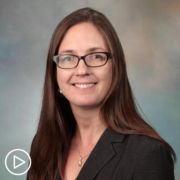 Dr. Jeanne Palmer: Why Is It Important for You to Empower Patients?
Dr. Jeanne Palmer: Why Is It Important for You to Empower Patients?